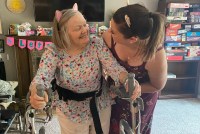Latest KFF Health News Stories
New Medicaid Work Rules Likely To Hit Middle-Aged Adults Hard
Republicans have said new rules requiring many Medicaid participants to work 80 hours a month will pinpoint unemployed young people who should have jobs. Policy researchers say the rules are more likely to disrupt coverage for middle-aged adults, harming their physical and financial health.
Cada vez más personas cuidan en casa a familiares que agonizan. Una organización enseña cómo hacerlo
La demanda de atención médica en casa, incluyendo los cuidados paliativos domiciliarios, se ha disparado desde el inicio de la pandemia de covid, al igual que el número de personas que cuidan a familiares.
More People Are Caring for Dying Loved Ones at Home. A New Orleans Nonprofit Is Showing Them How.
Demand for home health care, including at-home hospice care, has skyrocketed since the onset of the covid pandemic. A New Orleans nonprofit is teaching people how to provide end-of-life care for relatives and community members.
An Age-Old Fear Grows More Common: ‘I’m Going To Die Alone’
As families fracture, people are living longer and are more likely to find themselves without close relatives or friends at the end of their lives.
States Are Cutting Medicaid Provider Payments Long Before Trump Cuts Hit
North Carolina and Idaho are cutting their Medicaid programs to bridge budget gaps, raising fears that providers will stop taking patients and that hospitals will close even before the brunt of a new federal tax-and-budget law takes effect.
To Keep Medicaid, Mom Caring for Disabled Adult Son Faces Prospect of Proving She Works
A proposed work requirement would make Medicaid expansion enrollees prove they’re working or meet other criteria. Most already work, but millions are expected to lose coverage if the provision passes, many from red tape. A Missouri mother who cares for her disabled son would probably be subject to the rule.
Journalists Assess RFK Jr.’s Remaking of Vaccine Committee and Trend of Kids Caring for Elders
KFF Health News journalists made the rounds on national or local media recently to discuss topical stories. Here’s a collection of their appearances.
Role Reversal: Millions of Kids Are Caregivers for Elders. Why Their Numbers Might Grow.
As state officials anticipate Medicaid funding cuts that could strip resources for those with disabilities and chronic health conditions, an army of unpaid caregivers waits in the wings: children. At least 5.4 million kids are estimated to be caring for family members at home, a number likely to rise if Medicaid cuts hit professional home-based services.
When They Don’t Recognize You Anymore
People with dementia often forget even close family members as the disease advances. “It can throw people into an existential crisis,” an expert said.
Journalists Delve Into Effects of Deep Federal Cuts on Public Health
KFF Health News journalists made the rounds on national and local media recently to discuss topical stories. Here’s a collection of their appearances.
‘If They Cut Too Much, People Will Die’: Health Coalition Pushes GOP on Medicaid Funding
As House Republicans mull a massive $880 billion cut from federal programs likely including Medicaid, constituents, disability advocates, and health care providers are joining forces to lobby GOP members in California — including those who represent rural, deeply conservative pockets that stand to lose the most.
What the Health? From KFF Health News: The Campaign’s Final Days
It’s the final days of the 2024 campaign, and Republicans are suddenly talking again about making changes to the Affordable Care Act if former President Donald Trump wins. Meanwhile, new reporting uncovers more maternal deaths under state abortion bans — and a case in which a Nevada woman was jailed after a miscarriage. Lauren Weber of The Washington Post, Shefali Luthra of The 19th, and Jessie Hellmann of CQ Roll Call join KFF Health News’ Emmarie Huetteman to discuss these stories and more. Also this week, KFF Health News’ Julie Rovner interviews Irving Washington, a senior vice president at KFF and the executive director of its Health Misinformation and Trust Initiative.
What the Health? From KFF Health News: Yet Another Promise for Long-Term Care Coverage
As part of her presidential campaign, Vice President Kamala Harris has rolled out a plan for Medicare to provide in-home long-term care services. The proposal would fill a longtime need for families trying to simultaneously care for young children and older parents, but its enormous price tag makes it a promise unlikely to be fulfilled. Meanwhile, a growing number of Republican candidates up and down the ballot facing voter backlash over their support for abortion restrictions are trying to reinvent their positions. Shefali Luthra of The 19th, Jessie Hellmann of CQ Roll Call, and Joanne Kenen of Johns Hopkins University and Politico join KFF Health News’ Julie Rovner to discuss these stories and more. Also this week, excerpts from a KFF lunch with “Shark Tank” panelist and generic drug discounter Mark Cuban, who has been consulting with the Harris campaign about health care issues.
New Help for Dealing With Aggression in People With Dementia
A sedative shouldn’t be the first thing tried to help people with dementia who exhibit distressing behaviors. A new website is a comprehensive, free resource that offers guidance to caregivers.
Nuevas normas de elegibilidad son un alivio financiero para casi 2 millones de personas en Medi-Cal
Este grupo se equiparará a los aproximadamente 12 millones de otros beneficiarios que no tienen límites de activos.
New Eligibility Rules Are a Financial Salve for Nearly 2 Million on Medi-Cal
Nearly 2 million Medi-Cal enrollees, mainly people who are aged, disabled, or in long-term care, can now accumulate savings and property without limitations and still qualify for the state’s health insurance program for low-income residents. They join an additional roughly 12 million enrollees who already had no asset limits.
A New Medicare Proposal Would Cover Training for Family Caregivers
The federal government is proposing having Medicare pay professionals to train family caregivers how to perform tasks like bathing and dressing their loved ones, and properly use medical equipment.
How to Negotiate With Resistant Aging Parents? Borrow These Tips From the Business World
Negotiation techniques can help health care providers and family caregivers find common ground with older adults who resist advice or support.
Readers and Tweeters Weigh Marijuana’s Merits Against Those of Alcohol or Opioids
KFF Health News gives readers a chance to comment on a recent batch of stories.
Remote Work: An Underestimated Benefit for Family Caregivers
The debate about whether employees should be required to return to the workplace has generally focused on commuting, convenience, and child care. A fourth C, caregiving, has rarely been mentioned.






















